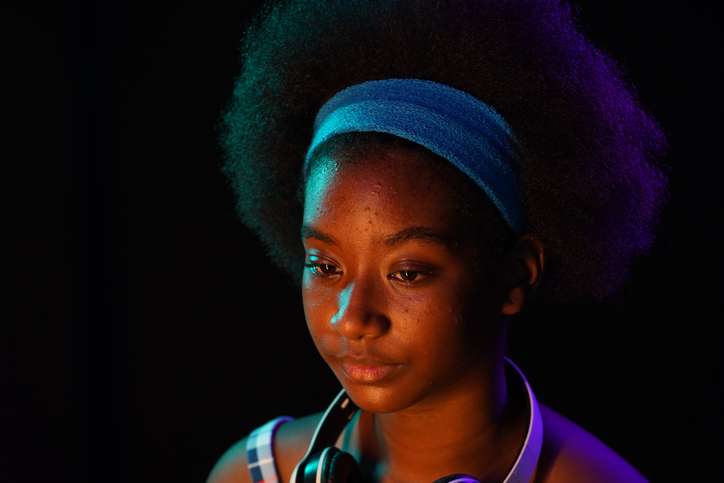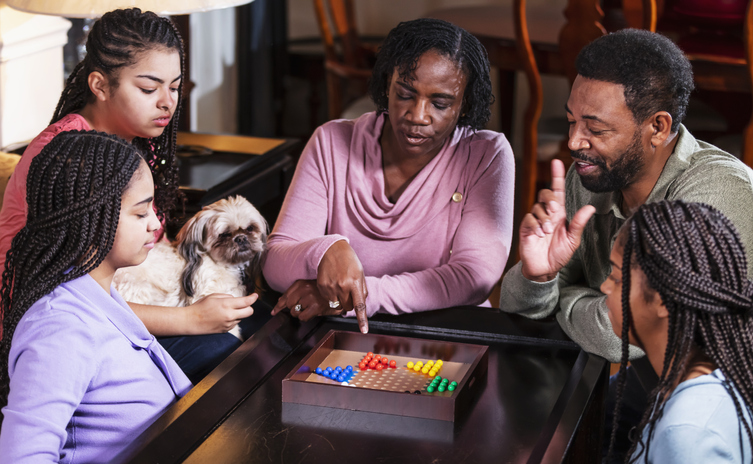
Source: Anna Frank / Getty
In case you missed it, World Teen Mental Wellness Day is a day that is recognized globally and is meant to raise awareness surrounding teen mental health issues. For adults, it can be difficult to differentiate between normal teen behavior (moodiness, social withdrawal) and mental health concerns. But if you ask a teen, they’ll likely tell you that depression is a major problem affecting their age group. Data out of Pew Research Center reveals that seven out of 10 teens, across most gender, racial and socio-economic lines, see mental health as a big problem facing teenagers. Pressure to get good grades, to fit in socially, to look good and to excel at extracurricular activities were listed as some of the top stressors causing mental health issues in teens.
While mental health issues cut across most demographic lines, there has been an increase in major depressive episodes among Black youth in recent years, says Mental Health America. Furthermore, teens who deal with issues of poverty, gang violence and teen pregnancy are more likely to struggle with mental health issues – each of which are issues that impact minority groups at a higher rate than white communities. The facts point to one thing: paying attention to your teen’s mental health is more important than ever. Here are facts about Black teen mental health and ways parents can be there for their kids.
Black Adolescent Suicide Is Increasing

Source: Puttipat Aneakgerawat / Getty
The Journal of the American Academy of Child and Adolescent Psychology reports that, as of 2018, suicide became the second leading cause of death in Black youth ages 10 to 14. One particular group is at a heightened risk: teenage girls. The research shows that the largest annual percentage change of suicide rates was in the 15- to 17-year age group among girls. This is part of a trend that has been occurring for several decades. The American Academy of Pediatrics reports that, between the years 1991 and 2017, Black adolescent suicide rose 73 percent.
Preexisting Issues In Suicidal Teens

Source: Robin Gentry / EyeEm / Getty
A study published in the National Library of Health examined Black teens who suffered from suicidal ideation and found common clinical issues that had been preexisting. These predominantly included relationship issues, mental health issues, interpersonal trauma and life stressors (such as grades or appearance). These concerns consistently occurred leading up to suicidal thoughts. While such issues seem like a “normal” part of teen life, the research indicates that dismissing them as such can have dire consequences.
Black Youth Receive Less Treatment

Source: SDI Productions / Getty
While Black youth are at a heightened risk for mental health issues, Mental Health First Aid says they are less likely to seek or receive treatment. In fact, while depression is the most common mental health condition among Black individuals, less than half of Black adolescents who report depression seek treatment. They’re also less likely to complete treatment, should they begin it. Research has additionally found that Black teens are less likely than white teens to have seen the adults in their lives go to therapy.
Parental Bias Are Part Of The Problem

Source: kali9 / Getty
As minors, Black teens rely heavily on their caregivers to take the lead on their mental health treatment. That also means their fate correlates heavily with their caregivers’ beliefs about mental health treatment. Research from Issues in Mental Health Nursing has found that the ideas and stigmas that caregivers of teens have surrounding mental health play a large part in why Black teens don’t receive treatment. These stigmas include the idea that there is something shameful about having mental health problems, and that mental health is not as important as physical health.
The Mental Health Field Lacks Diversity

Source: SDI Productions / Getty
Any patient of any age or racial group needs to feel that their mental healthcare provider understands them and relates to them. However, finding this in a therapist does not come easily to Black teens. As few as four percent of psychologists identify as Black, says the American Psychology Association, and even fewer psychiatrists identify as Black. With distrust of healthcare providers being one obstacle standing in a teen’s way of seeking help, this lack of diversity in the mental healthcare field poses a big issue.
Know The Signs

Source: Anna Frank / Getty
In order for parents to help their Black teenagers with mental health issues, the first thing they need to do is learn to recognize the signs. Research out of Rutgers University found that Black adolescents express symptoms of depression differently than other racial teen groups – namely through complaining of interpersonal issues or physical pain. Parents should pay close attention if their teen expresses increased concern over relationship or friendship drama, or there is an uptick in complaining of physical discomfort. The latter should be explored with a physician, but if a physical problem is ruled out, it could be due to mental health issues.
Keep The Lines Of Communication Open

Source: MoMo Productions / Getty
Research out of the National Library of Health has found that anxiety and depression is less common in teens who feel bonded to their parents and who trust their parents. So while social isolation from the parental unit can seem “normal” for teens, parents shouldn’t accept it entirely. Keep the lines of communication open. Make family dinners a priority. Do not dismiss moodiness in teens as standard teen behavior – talk to your kids about what they’re feeling. Parents shouldn’t write off teenage issues – such as relationship drama or appearance insecurities – as “not important.” If they’re important to a teen and not addressed, they can lead to mental health issues.
Normalize Seeking Help

Source: Caia Image / Getty
Much of the research on caregivers of teens with depression indicates that the caregivers’ beliefs and opinions surrounding mental health care largely impact whether or not teenagers receive the help that they need. Parents can help their teens by making discussions about mental health a normal part of the conversation, removing the stigma from it, as well as speaking about mental healthcare providers in a positive manner.









